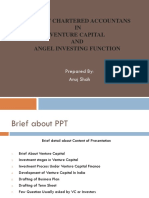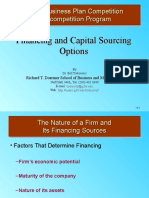0% found this document useful (0 votes)
22 views43 pagesLecture 2
The document discusses various sources of finance for ventures, including Business Angels, Bank Finance, Private Equity, and Venture Capital (VC). It outlines the characteristics and roles of these investors, particularly focusing on how VCs operate, evaluate ventures, and make investment decisions. Key takeaways include the importance of market potential, team capabilities, and exit strategies in securing funding from VCs.
Uploaded by
vokafil823Copyright
© © All Rights Reserved
We take content rights seriously. If you suspect this is your content, claim it here.
Available Formats
Download as PDF, TXT or read online on Scribd
0% found this document useful (0 votes)
22 views43 pagesLecture 2
The document discusses various sources of finance for ventures, including Business Angels, Bank Finance, Private Equity, and Venture Capital (VC). It outlines the characteristics and roles of these investors, particularly focusing on how VCs operate, evaluate ventures, and make investment decisions. Key takeaways include the importance of market potential, team capabilities, and exit strategies in securing funding from VCs.
Uploaded by
vokafil823Copyright
© © All Rights Reserved
We take content rights seriously. If you suspect this is your content, claim it here.
Available Formats
Download as PDF, TXT or read online on Scribd
/ 43





















































































